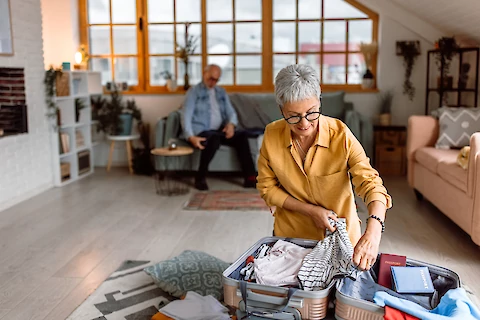
Are you a senior who loves to explore and embark on adventures? If so, you want to be prepared for the unexpected, and that's where a travel emergency kit comes into play. This handy collection of items will help you stay safe and comfortable during car trips, day trips, and extended journeys.
Universal Basics for a Travel Emergency Kit
When it comes to packing a travel emergency kit, there are some essentials that every senior should have on hand. You want to have a well-stocked first aid kit. This should include items such as bandages, gauze, adhesive tape, antibiotic ointment, and pain relievers. Accidents can happen at any time, so being prepared with basic medical supplies is a must.
Another critical aspect of your emergency kit is having a list of emergency contact information. This can include phone numbers for family members, your doctor, and even your pharmacy. Additionally, always carry your medical insurance card with you in case of an emergency.
Medications, both prescription and over-the-counter, should also be included in your kit. You want to pack enough medication to last the duration of your trip. If you're traveling by air, you need to check with the TSA about items you can carry on the plane or need to pack.
Hygiene items like hand sanitizer, tissues, and wet wipes are essential for cleanliness and staying healthy while traveling. Food and water are equally important - pack some non-perishable snacks and bottled water to keep you going in case you find yourself stranded or unable to access food.
Don't forget to include some basic tools in your kit: a flashlight, whistle, and multi-tool can all come in handy in various situations. Also, pack extra clothing, such as layers, rain gear, and a hat to protect you from the elements. Lastly, a blanket or space blanket is a great addition to your kit to keep you warm and cozy during unexpected situations.
Personalizing Your Travel Emergency Kit
While the universal basics are a great foundation for your travel emergency kit, consider your unique needs and preferences. You should consider packing extra quantities of any prescription medications you require, as well as any other health-related items like inhalers or hearing aid batteries.
Keep your travel destination in mind when packing your kit. If you're going somewhere with lots of suns, bring sunscreen; if you're going to an area with lots of insects, pack insect repellent. Plan for the activities you're most likely to enjoy while traveling, such as hiking or birdwatching, and include any necessary items like a walking stick or binoculars.
You want to be conscious of potential travel restrictions, especially when flying. You want to use TSA-approved containers for liquids and pack medications in their original containers if possible.
Tips for Organizing and Maintaining Your Travel Emergency Kit
Now that you know what to include, you want to keep your kit organized and up-to-date. Use a durable, easy-to-carry container such as a backpack, duffel bag, or plastic bin to keep everything together. Utilize zippered pouches or labels to keep items organized within the container.
Regularly check the expiration dates on medications and food items to ensure everything is still safe to use. Update your emergency contact information as needed to keep it current.
Senior Helpers Greater Knoxville Offers Seniors Help With Daily Activities
Having a well-equipped travel emergency kit is essential for seniors who love to travel. It can make all the difference in ensuring that your adventures are safe and enjoyable. If you are living in Knoxville, Maryville, Clinton, or Loudon, TN, and need assistance with senior care, contact us at Senior Helpers Greater Knoxville.